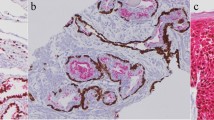Abstract
Cancer of unknown primary site is a common metastatic cancer, diagnosed in about 50 000 patients per year in the US. The diagnosis, classification, and management of patients with carcinoma of unknown primary site has been difficult and frustrating. The therapy has usually been empiric for the majority of patients, and their prognosis has been poor.
Molecular classification of metastatic cancers with known primary sites has been accurate (76–89%), as reported from several studies. Molecular profiling of initial biopsy specimens has tremendous potential as a test to diagnose the site of tumor origin in patients with unknown primary cancer. Several retrospective studies of molecular profiling assays have provided indirect validation of the accuracy of primary site prediction, based on correlations with clinicopathologic features. One additional study of initial diagnostic biopsies in unknown primary cancer patients, where primary tumor sites were identified months to years later, has provided more direct validation of the accuracy of molecular classification (the primary tumor sites of 15 of 20 patients were correctly predicted). The ability to diagnose and classify unknown primary cancer more precisely would allow for more site-specific or targeted therapy, and likely improve patient outcomes. Several clinical studies are in progress or planned to test this concept.


Similar content being viewed by others
References
Greco FA, Hainsworth JD. Cancer of unknown primary site. In: DeVita Jr VT, Hellman S, Rosenberg M, editors. Cancer: principles and practice of oncology. 8th ed. Philadelphia (PA): Lippincott, 2008: 2363–87
Hainsworth JD, Fizazi K. Treatment for patients with unknown primary cancer and favorable prognostic factors. Semin Oncol 2009; 36: 44–51
Pentheroudakis G, Golfinopoulos V, Pavlidis N. Switching benchmarks in cancer of unknown primary: from autopsy to microarray. Eur J Cancer 2007; 43: 2026–36
Oien K. Pathological evaluation of unknown primary cancer. Semin Oncol 2009; 36: 8–37
DeYoung BR, Wick MR. Immunohistologic evaluation of metastatic carcinomas of unknown origin: an algorithmic approach. Semin Diagn Pathol 2000; 17: 184–93
Al-Brahim N, Ross C, Carter B, et al. The value of postmortem examination in cases of metastasis of unknown origin-20 year retrospective data from a tertiary care center. Am Diagn Pathol 2005; 9: 77–80
Bender RA, Erlander MG. Molecular classification of unknown primary cancer. Semin Oncol 2009; 36: 38–43
Li X, Quigg RJ, Zhou J, et al. Clinical utility of microassays: current status, existing challenges and future outlook. Curr Genomics 2008; 9: 466–74
Sotiriou C, Piccart MJ. Taking gene-expression profiling to the clinic: when will molecular signatures become relevant to patient care? Nature Rev Cancer 2007; 7: 545–53
Golub TR, Slonim DK, Tamayo P, et al. Molecular classification of cancer: class discovery and class prediction by gene expression monitoring. Science 1999; 286: 531–7
Ramaswamy S, Tamayo P, Rifkin R, et al. Multiclass cancer diagnosis using tumor gene expression signatures. Proc Natl Acad Sci U S A 2001; 98: 15149–54
Su AI, Welsh JB, Sapinoso LM, et al. Molecular classification of human carcinomas by use of gene expression signatures. Cancer Res 2001; 61: 7388–93
Bloom G, Yang IV, Boulware D, et al. Multi-platform, multi-site, microarray-based human tumor classification. Amer J Path 2004; 164: 9–16
Tothill RW, Kowalczyk A, Rischin D, et al. An expression-based site of origin diagnostic method designed for clinical application to cancer of unknown origin. Cancer Res 2005; 65: 4031–40
Talantov D, Baden J, Jatkoe T. A quantitative reverse transcriptase-polymerase chain reaction array to identify metastatic carcinoma tissue of origin. J Mol Diag 2006; 8: 320–9
Rosenfeld N, Aharonov R, Meiril E, et al. MicroRNAs accurately identify cancer tissue origin. Nature Biotech 2008; 26: 462–9
Monzon FA, Lyons-Weiler M, Buturovic LJ, et al. Multicenter validation of a 1,550-gene expression profile for identification of tumor tissue of origin. J Clin Oncol 2009; 27: 2503–8
Horlings HM, van Laar R, Kerst J-M, et al. Gene expression profiling to identify the histogenetic origin of metastatic adenocarcinomas of unknown primary. J Clin Oncol 2008; 26: 4435–41
Varadhachary G, Talantov D, Raber M, et al. Molecular profiling of carcinoma of unknown primary and correlation with clinical evaluation. J Clin Oncol 2008; 26: 4442–8
Bridgewater J, van Laar R, Floore A, et al. Gene expression profiling may improve diagnosis in patients with carcinoma of unknown primary. Br J Cancer 2008; 98: 1425–30
Ma X-J, Pate R, Wang X, et al. Molecular classification of human cancers using a 92-gene real-time quantitative polymerase chain reaction array. Arch Path Lab Med 2006; 130: 465–73
Pillai R, Deeter R, Rigl CT, et al. Validation of a microarray-based gene expression test for tumors with uncertain origins using formalin-fixed paraffin-embedded (FFPE) specimens [abstract no. e22015]. J Clin Oncol 2009; 27 (15S) [online]. Available from URL: http://meeting.ascopubs.org/cgi/content/abstract/27/15S/e22015 [Accessed 2009 Sep 13]
Pentheroudakis G, Briasoulis E, Pavlidis N. Cancer of unknown primary site: missing primary or missing biology? Oncologist 2007; 12: 418–25
Varadhachary GR, Raber MN, Matamoros A, et al. Carcinoma of unknown primary with a colon-cancer profile-changing paradigm and emerging definitions. Lancet Oncol 2008; 9: 596–9
Monzon FA, Henner WD, Medeiros F. Use of microarray-based 1550-gene expression profile-of carcinoma of unknown primary (CUP) [abstract no. 313]. Gastrointestinal Cancers Symposium, American Society of Clinical Oncology; 2009 Jan 15–17; San Francisco (CA)
Greco FA, Spigel DR, Yardley DA, et al. Unknown primary cancer (UPC): accuracy of tissue of origin prediction by molecular profiling [abstract no. 11070]. J Clin Oncol 2009; 27 (15S) [online]. Available from URL: http://meeting.ascopubs.org/cgi/content/abstract/27/15S/1 1070 [Accessed 2009 Sep 13]
van Laar RK, Ma XJ, de Jong D, et al. Implementation of a novel microarray-based diagnostic test for cancer of known primary. Int J Cancer 2009; 125: 1390–7
Acknowledgments
Dr Greco has received consultancy fees and speakers’ honoraria from bioTheranostics, Inc. Dr Erlander is an employee of bioTheranostics, Inc. and holds stock options in the company.
Author information
Authors and Affiliations
Corresponding author
Rights and permissions
About this article
Cite this article
Greco, F.A., Erlander, M.G. Molecular Classification of Cancers of Unknown Primary Site. Mol Diag Ther 13, 367–373 (2009). https://doi.org/10.1007/BF03256342
Published:
Issue Date:
DOI: https://doi.org/10.1007/BF03256342




